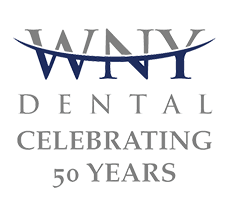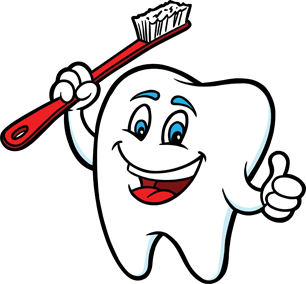We recommend scheduling your child’s dental appointments every six months. We will do an oral exam, clean your child’s teeth and apply fluoride at each of these appointments.
At about 6 months, the two lower front teeth (central incisors) will typically erupt first, followed shortly by the two upper central incisors. The remainder of the baby teeth appear during the next 18 to 24 months, but not necessarily in an orderly sequence from front to back. At 2 to 3 years, all of these 20 primary teeth should be present.
Sore gums and jaws when teeth erupt are part of the normal eruption process. The discomfort is eased for some children by use of a teething biscuit, a piece of toast, or a frozen teething ring. Your pharmacy may also have medications that can be rubbed on the gums to reduce the discomfort.
A toothbrush with soft bristles and a very small head is the best choice for infants and toddlers. Brushing at least once a day, at bedtime, will remove plaque bacteria that can lead to decay.
We recommend using fluoride toothpaste when your child's first baby molars emerge. At this stage, it is important to limit the amount to a smear of toothpaste. As your child grows and becomes more comfortable spitting, the amount should increase to about the size of a pea.
Thumb and pacifier habits that go on for a long period of time can create crowded and crooked teeth or bite problems. If children are still sucking their thumbs or fingers when the permanent teeth arrive, a mouth appliance may be recommended by your dentist. Most children stop these habits on their own.
We recommend replacing your child’s toothbrush every three to four months, or if the bristles are noticeably worn. Also, if your child gets sick, replace the toothbrush after he/she is well again.
Yes! Remember, your child will likely need your help to floss. It is an important habit to start. Encourage your child to floss at least once a day.
To comfort your child, rinse his/her mouth with warm salt water and apply a cold compress or ice wrapped in a cloth on your child's face if it is swollen. Do not put heat on the sore area. See us as soon as possible.
Four things are necessary for cavities to form -- a tooth, bacteria, sugars or other carbohydrates and time. Dental plaque is a thin, sticky, colorless deposit of bacteria that constantly forms on everyone's teeth. When you eat, the sugars in your food cause the bacteria in plaque to produce acids that attack the tooth enamel. With time and repeated acid attacks, the enamel breaks down and a cavity forms.
Primary, or "baby," teeth are important for many reasons. Not only do they help children speak clearly and chew naturally, they also aid in forming a path that permanent teeth can follow when they are ready to erupt. Some of them are necessary until a child is 12 years old or longer. Pain, infection of the gums and jaws, impairment of general health and premature loss of teeth are just a few of the problems that can happen when baby teeth are neglected.
All of our practices use digital x-rays. The amount of radiation received in a digital dental x-ray is extremely small, much less than conventional dental x-rays. Even though there is very little associated risk, our dentists are always careful to minimize the exposure of our patients to radiation.
A mouth guard should be a top priority on your child's list of sports equipment. Athletic mouth protectors, or mouth guards, are made of soft plastic and fit comfortably to the shape of the upper teeth. They protect a child's teeth, lips, cheeks, and gums from sports-related injuries. Any mouth guard works better than no mouth guard, but a custom-fitted mouth guard fitted by our dentist is your child's best protection against sports-related injuries.
Western New York Dental Group’s Online Bill Pay service lets you pay your bill online and helps you access information about your customer account via a secure website which is HIPAA and PCI compliant. You will see the total of your current bill and your due date. Now, our patients can pay their bills online with a major credit card. For this service, Western New York Dental Group has partnered with Apex — a major national provider of payment processing. You can log into the Online Bill Pay system 24 hours a day, 7 days a week, from any computer with Internet capabilities.
With Online Bill Pay, you can:
-Make fast and secure payments online.
-View all your past statements up to 18 months.
-Schedule automatic payments for your statement balances.
-Get notified via email and text messages about new e-statements.
-Save a payment method to make future payments quicker.
-Access your account anytime 24 hours a day, 7 days a week.
You can enroll into Online Bill Pay using the myEasyMatch Code which is located on your paper statement. You will also need a valid email address. Follow the simple on-screen instructions to enroll. Once you have finished the enrollment process, you will receive a validation email and will need to click on the link provided to activate your online account. If the link is not activated, your Online Bill Pay enrollment will be incomplete and you will continue to receive paper statements.
The myEasyMatch code is a unique code assigned to your account. This code helps us identify your account when you enroll into Online Bill Pay or when you want to make a one-time payment. This code is located on your paper statement just below your mailing address.
All transactions are processed through a secure website and all data transactions are encrypted. You have the option of saving the financial payment information you enter (like your credit card details, etc.) so you can use the same information again when you pay your next bill. All these transactions take place in a secure environment.
All patients are eligible for the Online Bill Pay service.
There is no processing fee. Viewing your account information (amount due, due date and last payment information) and paying your bill is free of charge.
eStatements are electronic versions of your paper bills. It is a free service to all our Online Bill Pay patients. With eStatements you can view details online, access past statements and make online payments. And, so you never miss a payment, you can even choose to receive an email reminder when your bill arrives.
Once your payment is processed online, the transaction cannot be canceled. The amount you selected to pay will be credited to your account.
If you believe that you’ve made your payment and the credit is not reflected on your bill, please contact your local dental office for assistance.
No. You can pay your bill when you receive your e-statement.
Our credit card processing vendor enables us to accept both MasterCard, Visa and Discover credit and debit cards.
If you’ve made your payment online, we don’t need the stub. You may want to keep it for your own records and write your confirmation number on it.
Your online bill payment will appear on your credit card statement as a payment made on the date you made it.
If your mailing address has changed, please contact your local dental office with the correct information and we’ll update our files.































